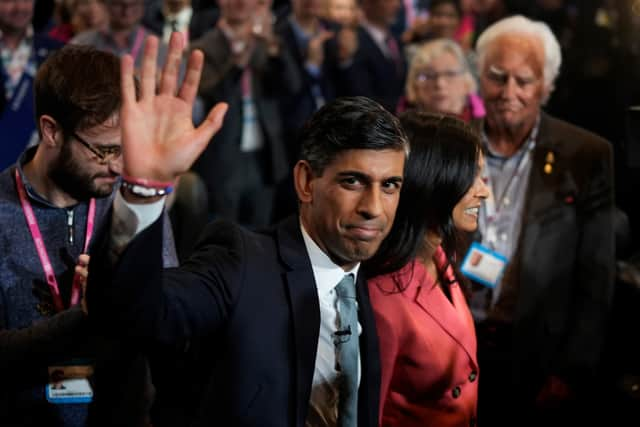Who began HS2? When was the project started, which Prime Minister and government started it - Tory or Labour
and live on Freeview channel 276
The Prime Minister has declared that the government will support a number of transportation initiatives, after cutting HS2 north of Birmingham.
Rishi Sunak has promised to “reinvest every single penny, £36bn, in hundreds of new transport projects in the north and the midlands, across the country”.
Advertisement
Hide AdAdvertisement
Hide AdThis includes developing what he called Network North, which entails enhancing the bus, rail, and road networks.
Over the years, HS2 has been a subject of political debate, with different parties and politicians taking varying positions on it. Something of a political football, with parties using it as a point of contention, the latest twist in the tale is sure to only fire up those debates further.
But which government is ultimately responsible for HS2? Which politicians were instrumental in its development, and how did it come to be? Here is everything you need to know about it.
Who started HS2?
HS2 was initially proposed and launched by the Labour Party - led by Prime Minister Gordon Brown at the time - during its time in government. The project was officially announced by Labour's Secretary of State for Transport, Andrew Adonis, in March 2010.
Advertisement
Hide AdAdvertisement
Hide AdBut it was the Conservative Party, which came to power in the UK in May 2010 under Prime Minister David Cameron, that continued to support and eventually gave the project the go-ahead.
Justine Greening served as the Secretary of State for Transport in Cameron's government and was responsible for overseeing the project during its early stages; when Patrick McLoughlin succeeded Greening, he continued to champion the HS2 project during his tenure.
As Prime Minister from 2016 to 2019, Theresa May's government reaffirmed its commitment to HS2. While there were debates and discussions about the project's costs and benefits, her government did not reverse its support for the project.
Boris Johnson, who became Prime Minister in July 2019, initially expressed some reservations about HS2, particularly regarding its cost. However, his government ultimately confirmed its support for the project after a review, and construction continued under his leadership.
Advertisement
Hide AdAdvertisement
Hide AdSo, while the project was initially proposed and launched by the Labour Party, it received cross-party support and was advanced by Conservative governments as well. It is a major infrastructure project aimed at improving rail connectivity in the UK.


Why was it started?
The idea for HS2 began to take shape in the mid-2000s as a response to the increasing capacity constraints on the existing rail network, particularly the West Coast Main Line, which connects London to major cities in the North of England and Scotland.
The existing rail infrastructure was becoming congested and unable to meet the growing demand for passenger and freight services. Various options were considered to address these challenges, but ultimately, it was decided that plans to develop a high-speed rail network would be put into action.
At one point in time, HS2 consisted of two main phases, with multiple branches, connecting major cities in England.
Advertisement
Hide AdAdvertisement
Hide Ad'Phase One' - which remains under development - is planned to connect London to Birmingham. It will start at London Euston station in the capital and terminate at a new high-speed station called Birmingham Curzon Street.
In 2013, the government announced a 'Phase Two' extension of the HS2 route to include a Y-shaped network, with one branch heading north from Birmingham to Manchester and the other to Leeds. This expansion aimed to improve rail connectivity to major cities in the North of England.
The branch to Leeds was cancelled in 2021, and with the recently announced cancellation of the Manchester branch, Phase Two will never be completed.
How was HS2 received?
Some political commentators and experts argued that HS2 would provide significant economic benefits by improving connectivity between major cities and boosting economic growth, job creation and investment, particularly in the North of England.
Advertisement
Hide AdAdvertisement
Hide AdProponents pointed to the capacity constraints on existing rail lines and argued that a high-speed rail network was necessary to alleviate congestion and meet the increasing demand for rail travel.
Supporters also highlighted potential environmental benefits, as high-speed rail could be a more environmentally friendly mode of transportation compared to cars or planes for certain routes.
Some commentators noted that other countries, such as France, Germany, and Japan, had successfully implemented high-speed rail networks, and the UK should not fall behind in terms of modern transportation infrastructure.
But critics expressed concerns about the project's cost, which was estimated to be in the tens of billions of pounds, and questioned whether the economic benefits would justify the high price tag and whether the money could be better spent on other infrastructure projects like upgrading existing rail lines or investing in regional rail connectivity.
Advertisement
Hide AdAdvertisement
Hide AdOpponents also raised concerns about the environmental impact of the project, particularly during the construction phase, with the destruction of natural habitats and potential damage to the landscape particularly strong points of contention.
This opposition was particularly focused in rural communities along the proposed HS2 route, which were concerned about disruptions, property values and the loss of countryside.
Comment Guidelines
National World encourages reader discussion on our stories. User feedback, insights and back-and-forth exchanges add a rich layer of context to reporting. Please review our Community Guidelines before commenting.
